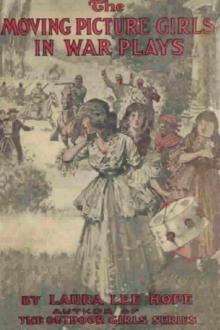An Island Story by H. E. Marshall (ebook pc reader .TXT) 📖

- Author: H. E. Marshall
- Performer: -
Book online «An Island Story by H. E. Marshall (ebook pc reader .TXT) 📖». Author H. E. Marshall
From the German point of view this wrath was justified. For Belgium had ruined their plans. They had meant to crush France first, then free of all anxiety in the West, turn to Russia and crush her. Thus the war would have been brought to a speedy, and for them, triumphant, end, and Germany would have been in a position to dictate to all Europe. She would have been well on the way to gain the world dominion she coveted. But Belgium raised her puny arm, and the blow which was to have felled France, and laid her helpless at the feet of the conqueror, failed.
But although the enemy was forced to retreat almost from the walls of Paris the Allies were not strong enough to force them back to their own borders. The German advance had been rapid. The retreat was terribly slow and for more than four years northern France and a great part of Belgium were a battle field.
During these years, because of her watchful navy, no foreign foe landed on British soil. But although saved from the awful devastation of war, our island became a changed land. In a few months from being a peaceful manufacturing nation we were changed into a nation of soldiers, the whole country becoming one huge camp. Boys who had just left school, young men from the workshops and farms, from the universities and colleges, men of high and low estate, all flocked to join the army. Older men too, men already settled in business or profession, left their families and their work, and marched to fight for right and freedom. They came not only from our little island kingdom, but from every colony and dependency of the world-wide empire, proving once again that the bonds that bind the empire are strong, and her people faithful in their loyalty even unto death.
At first save for our small standing army—our “contemptible little army” as the Kaiser called it—all our soldiers were volunteers. Then as the war went on, and death took a fearful toll, there came the call for more men and still more men. The volunteers had come in numbers wonderful beyond belief. Still they were not enough, and conscription was introduced. This means that every able-bodied man was forced to serve as a soldier.
It was with some reluctance that conscription was introduced as it seemed somewhat foreign to our free traditions. But under the stress of war Britons willingly gave up many of the liberties which they had won by centuries of hard struggle. Such things as freedom of speech and the freedom of the press were no more. Even private letters were censored. That is they were opened and read by government officials before being sent on to the people to whom they were addressed. In everything, in fact, the comfort or pleasure of the individual had to be sacrificed to the general need of the country.
When the conscripted men were taken for the army there were not enough left to do the work of the country. Then the women showed themselves to be the true sisters of their menfolk. They filled the factories and offices, they became farm laborers, ticket collectors, porters, ‘bus conductors. In fact everywhere where labor was short women filled the breach. While the men were “facing fearful odds” in a foreign land, the women wrestled with and mastered their jobs at home. Therein they found some comfort, and some sense of comradeship with their men folk at the front. They too were at the front.
So as time went on all Britain became one vast factory of war. All life hinged on it, all thought turned to it, every one in some way or another was engaged in it. Life in those days was a strange, exciting, unhappy thing.
In many ways the war was unlike any other war. In Europe especially it was distinguished by its fixedness. As a rule we connect movement with war. We think of armies marching hither and thither over large tracts of country. But after the rapid advance of the Germans at the beginning of the war and the retreat which followed, the war in France and Flanders was not one of movement and pitched battles, but of trenches. Each side, on a long line stretching from the borders of Switzerland to the sea, dug itself into the ground. There for weeks and months together they faced each other, constantly sniping, bombing, and shelling each others’ positions. At intervals this developed into furious battles, raging over vast areas, and lasting for days and even weeks. In consequence of these battles the line of trenches was sometimes pushed backward, sometimes forward, as one or other side gained some advantage. In this manner some parts of the country were fought over three or four times, and their condition at the last was desolate beyond all description.
This war was unlike others also in its horror and deadliness. Never before had such huge guns been used, such powerful explosives. Never before had liquid flame and clouds of poison gas been used as weapons of war.
It was Germany generally who led the way with new horrors. But soon the Allies too bent all their energies toward inventing and improving weapons of destruction. Even the greatest scientists turned their thoughts to such matters. For the wisest saw that the world must have peace if civilization was not to go down in the dust. The victory of Germany would have meant the enslavement of Europe. So to preserve our liberties we fought fire with fire and devised fiendish instruments of destruction.
Peaceful inventions also, like the telephone and wireless telegraphy, were pressed into the service of war. Aeroplanes too were used for the first time, adding a new horror to war. For not only did death now rain from the skies, but gun fire was directed by observers in aeroplanes, thereby becoming more sure and deadly.
There was war on land, war on the sea, war underground, war under water and war in the air. But the huge German navy which had caused so much heartburning, and cost so many millions to build, did little throughout the whole war. Once or twice German ships made a dash across the North Sea, bombarded some defenseless seaside town, and sped away again. But these tip and run expeditions were of no value. They were performances wholly unworthy of a great navy. Besides these there were a few naval battles, the last fought off Jutland in May 1916. In that battle the Germans were not defeated. Aided by night and mist most of the ships got safely back to port. Yet the Germans had had enough of British seamen and could never again be forced to face them. Once more indeed some of their ships put out to sea, but at the approach of the British navy they fled. After that the great ships lay rotting in port, and when towards the end of the war an attempt was made to use the fleet again, it was met by mutiny on the part of the sailors.
Although the German fleet proved a useless luxury the Germans were by no means unsuccessful in causing destruction on the seas. But their weapons were not mighty ships but mines and submarines. They sowed mines broadcast, and, in an endeavor to starve and terrify the Allies into submission, at length declared a ruthless submarine warfare. “We can bottle up England,” said the German Admiral von Tirpitz, “we can torpedo every ship of the English or of the Allies, which nears any harbor in Great Britain, thereby cutting off all large food supplies.”
It was a campaign of “frightfulness” which made the seas unsafe for all the world. Neutral and enemy ships, passenger steamers, hospital ships, merchantmen, anything and everything which came within their reach was torpedoed and sunk. But this ruthlessness, like the ruthless trampling through Belgium, was a blunder as well as a crime, for perhaps more than everything else it brought the United States of America into the war against Germany.
In the spring of 1917 the submarine campaign was at its worst. Then one quarter of the vessels which left British ports never returned. True, our navy destroyed many submarines, but the Germans built them faster than we destroyed them, and they sunk ships faster than we could build them. But nothing could destroy the courage of the British merchant seamen. Undaunted by all the terrors of war they crossed the seas again and again, knowing well that every voyage might be their last. They were not soldiers, they had not “signed on” for war, and almost to the end they went unarmed and unguarded. But they knew “If any one hinders our coming you’ll starve” and with a courage never equaled they allowed nothing to hinder their coming or going. Without the amazing grit of the merchant seamen all England’s great navy could scarcely have availed to keep her people from starvation.
But in spite of all our gallant seamen could do food ran short. Then the whole nation was put on rations, each person being allowed to buy only a certain small quantity of the most necessary foods each week. No one was allowed to have more than another, and those who hoarded food were liable to fines and imprisonment.
Such restrictions were tiresome and irritating, and added something to the general misery of the war. But the terror which the enemy had designed for us never struck home to our hearts. We
“Never doubted clouds would break,
Never dreamed, though right were worsted, wrong would triumph”
The air raid was another form of frightfulness which tried the nerves, if it did not shake the courage of the people. Again and again London and various seaside places were attacked by Zeppelins and aeroplanes. Some people were killed, and a good deal of damage was done to buildings. But those raids were of no military value, they aided Germany no whit toward victory. They were only one more horror of war. But because of them at night the whole land was plunged into darkness, for they were almost always made at night, and lest the enemy should be guided by the light of towns and villages all streets were darkened, and the lights in houses were carefully screened. From sunset to sunrise too no public clock was allowed to strike, no bells were allowed to be rung.
The strain on all the countries taking part in the war was terrible, and under the strain Russia broke into revolution. At first it seemed as if Russia had but risen in her strength, to burst the chains of despotism by which she had been bound during long ages, and that free Russia would march irresistibly to victory. But soon it became plain that freedom in Russia meant chaos. Discipline, law, and order disappeared, and very quickly Russia dropped out of the world war to be involved in a devastating civil war.
This was a disaster to Russia, it was also a disaster for the Allies. For having nothing more to fear from Russia, Germany was able to use all her might to defeat the Allies on the Western front. But almost as soon as Russia fell away the loss was made good, for in April 1917 the United States joined the Allies. Already too Germany had reached and passed the climax of her efforts. She knew already that she could not hope for a sweeping victory.
Still she fought on, and it was not until the autumn of 1918 that victory





Comments (0)